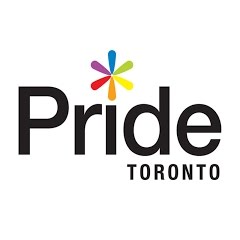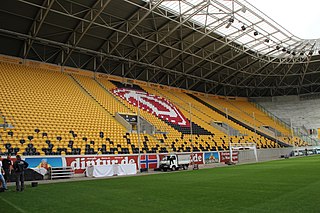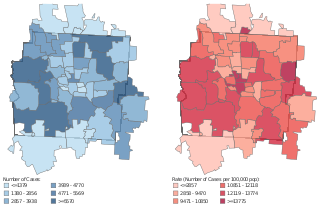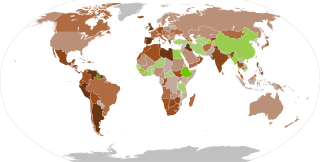
Pride Toronto is an annual event held in Toronto, Ontario, Canada, in June each year. A celebration of the diversity of the LGBT community in the Greater Toronto Area, it is one of the largest organized gay pride festivals in the world, featuring several stages with live performers and DJs, several licensed venues, a large Dyke March, a Trans March and the Pride Parade. The centre of the festival is the city's Church and Wellesley village, while the parade and marches are primarily routed along the nearby Yonge Street, Gerrard Street and Bloor Street. In 2014, the event served as the fourth international WorldPride, and was much larger than standard Toronto Prides.

The term "behind closed doors" is used in several sports, to describe matches played where spectators are not allowed in the stadium to watch. The reasons for this may include punishment for a team found guilty of a certain act in the past, stadium safety problems, public health concerns, or to prevent potentially dangerous clashes between rival supporters. In football, it is predicated by articles 7, 12 and 24 of FIFA's disciplinary code.

Sudbury Pride is a 2SLGBTQ+ Pride advocacy organization based in Greater Sudbury, Ontario, Canada. Their now annual Pride festival, held for the first time in 1997 and organized by a committee that included sociologist Gary Kinsman, was the first Pride event in Northern Ontario, and the only one in the region until the launch of Thunder Bay's Thunder Pride festival in 2010.

The BAPS Shri Swaminarayan Mandir in Etobicoke, Toronto, Ontario, Canada is a traditional Hindu place of worship that was built by the BAPS Swaminarayan Sanstha. The BAPS Swaminarayan Sanstha, which is headed by Mahant Swami Maharaj, is a global spiritual organization within the Swaminarayan branch of Hinduism. The mandir was built in 18 months and consists of 24,000 pieces of hand-carved Italian carrara marble, Turkish limestone and Indian pink stone. The mandir is the largest of its kind in Canada and was constructed according to guidelines outlined in ancient Hindu scriptures. The grounds spread over 18 acres and in addition to the mandir, include a haveli and the Heritage Museum. The mandir is open daily to visitors and for worship. In July 2017, the temple celebrated its 10-year anniversary.

WorldPride, licensed by InterPride and organized by one of its member organizations, is an event that promotes lesbian, gay, bisexual, transgender, and queer issues on an international level through parades, festivals and other cultural activities. The inaugural WorldPride was held in Rome in 2000. The host cities are selected by InterPride, the International Association of Pride Coordinators, at its annual general meeting.
Doors Open Ottawa is an annual event held in the City of Ottawa, Ontario, Canada, that gives the public access to many of the city's unique and historically significant buildings. Among the buildings included are government offices, museums, radio stations, places of worship, embassies, and historical landmarks. It is the second-oldest Doors Open event in North America; after Doors Open Toronto.

Fierté Montréal, also called Montreal Pride, is an annual LGBT pride festival in Montreal, Quebec. The event was founded in 2007 at the initiative of Montreal’s LGBTQ+ communities after the city's prior Pride festival, Divers/Cité, repositioned itself as a general arts and music festival.

The COVID-19 pandemic had a negative effect on certain films in the early 2020s, mirroring its impacts across all arts sectors. Across the world, and to varying degrees, cinemas and movie theaters were closed, festivals were cancelled or postponed, and film releases were moved to future dates or delayed indefinitely. Due to cinemas and movie theaters closing, the global box office dropped by billions of dollars, streaming saw a significant increase in popularity, and the stock of film exhibitors dropped dramatically. Many blockbusters originally scheduled to be released by mid-March 2020 were postponed or canceled around the world, with film productions also being halted. This, in turn, created openings for independent cinema productions to receive wider exposure.

The COVID-19 pandemic caused the most significant disruption to the worldwide sporting calendar since World War II. Across the world and to varying degrees, sports events were cancelled or postponed. The 2020 Summer Olympics in Tokyo were rescheduled to 2021. At the time, spectators had no games to watch and players no games to play. Only a few countries and territories, such as Hong Kong, Turkmenistan, Belarus, and Nicaragua, continued professional sporting matches as planned.

The COVID-19 pandemic in Quebec was part of the global pandemic of coronavirus disease 2019 (COVID-19), a novel infectious disease caused by severe acute respiratory syndrome coronavirus 2 (SARS-CoV-2). Until 2021, Quebec had reported the highest number of COVID-19 cases in Canada, eventually overtaken by Ontario.

The COVID-19 pandemic is an ongoing viral pandemic of coronavirus disease 2019 (COVID-19), a novel infectious disease caused by severe acute respiratory syndrome coronavirus 2 (SARS-CoV-2). The pandemic affected the city of Columbus, Ohio, as Ohio's stay-at-home order shuttered all nonessential businesses, and caused event cancellations into 2021. The shutdown led to protests at the Ohio Statehouse, the state capitol building.

The ongoing COVID-19 pandemic has highlighted inequities experienced by marginalized populations, and has had a significant impact on the LGBT community. Gay pride events were cancelled or postponed worldwide. More than 220 gay pride celebrations around the world were canceled or postponed in 2020, and in response a Global Pride event was hosted online. LGBTQ+ people also tend to be more likely to have pre-existing health conditions, such as asthma, HIV/AIDS, cancer, or obesity, that would worsen their chances of survival if they became infected with COVID-19. They are also more likely to smoke.
The 2021 Canadian Open were outdoor hard court tennis tournaments played from August 6 to August 15, 2021, as part of the 2021 US Open Series. The men's event took place at the Aviva Centre in Toronto, and the women's tournament at the IGA Stadium in Montreal. It was the 131st edition of the men's tournament—a Masters 1000 tournament on the 2021 ATP Tour, and the 119th edition of the women's tournament—a WTA 1000 tournament on the 2021 WTA Tour.

The COVID-19 pandemic in Montreal is part of an ongoing global pandemic of coronavirus disease 2019 (COVID-19), a novel infectious disease caused by severe acute respiratory syndrome coronavirus 2 (SARS-CoV-2). Until April 2021, Montreal was the worst affected health region in Canada. Despite being surpassed by Toronto in total number of cases, Montreal still has the highest total death count and the highest death rate in Canada, with the death rate from COVID-19 being two times higher on the island of Montreal than in the city of Toronto due in large part to substantial outbreaks in long-term care homes. Montreal is Canada's second most populous city, the largest city in Quebec, and the eighth most populous city in North America.
The COVID-19 pandemic is an ongoing viral pandemic of coronavirus disease 2019 (COVID-19), a novel infectious disease caused by severe acute respiratory syndrome coronavirus 2 (SARS-CoV-2). The pandemic has affected the Cities of Mississauga and Brampton, and the Town of Caledon, within the Regional Municipality of Peel. As part of the larger closure decisions in Ontario, a stay-at-home order shuttered all nonessential businesses, and caused event cancellations.
The COVID-19 pandemic in Toronto is an ongoing viral pandemic of coronavirus disease 2019 (COVID-19), a novel infectious disease caused by severe acute respiratory syndrome coronavirus 2 (SARS-CoV-2). Toronto is the most populous city in Canada, and the fourth most populous city in North America.

The 2020 Toronto International Film Festival, the 45th event in the Toronto International Film Festival series, was held from September 10 to 21, 2020. Due to the COVID-19 pandemic in Toronto, the festival took place primarily on an online streaming platform, although limited in-person screenings still took place within the constraints of social distancing restrictions.

The COVID-19 pandemic had a deep impact on the Canadian economy, leading it into a recession. The government's social distancing rules had the effect of limiting economic activity in the country. Companies started mass layoffs of workers, and Canada's unemployment rate was 13.5 percent in May 2020, the highest it has been since 1976.

The COVID-19 pandemic in the United Kingdom has had far-reaching consequences in the country that go beyond the spread of the disease itself and efforts to quarantine it, including political, cultural, and social implications.
The COVID-19 pandemic in New South Wales is part of the ongoing worldwide pandemic of the coronavirus disease 2019 caused by severe acute respiratory syndrome coronavirus 2. The first confirmed case in New South Wales was identified on 19 January 2020 in Sydney where three travellers returning from Wuhan, Hubei, China, tested positive for the virus.














